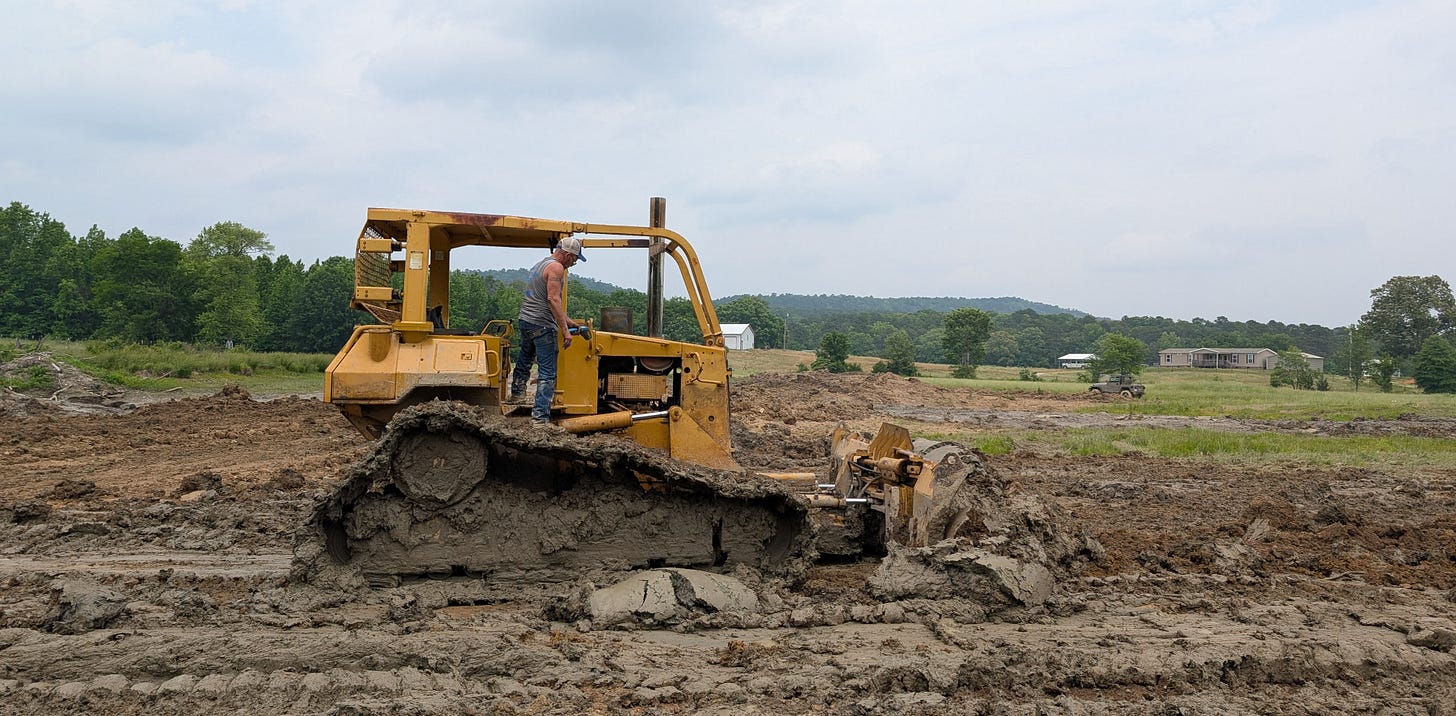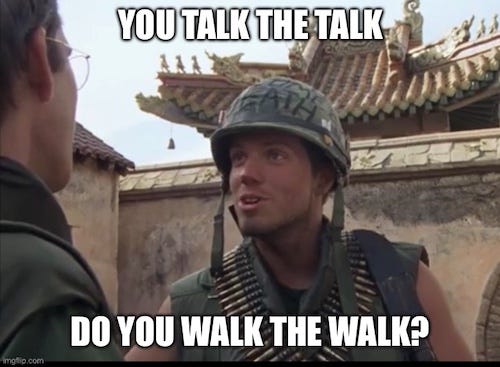Be Trained… or Be Chained
Because ‘shit happens’ is not a strategy.
I’ve always disdained the phrase “shit happens.”
It’s passive voice packed into four letters.
Well—technically, the passivity isn’t in the shit.
It’s in the happens.
That’s the surrender part.
It says you’re not in control—just another poor bastard choking down someone else’s idea of a life.
And a lot of folks seem to have made peace with that.
They wait.
They comply.
They outsource their judgment—and call it safety.
Somewhere along the way, they started selling the idea that you’re either a victim or an oppressor.
No middle ground. No nuance. No room for self-reliance.
Well, I have zero interest in oppressing anyone—and I’ll chew glass before I let anyone make me a victim.
That binary? It’s a trap.
It robs people of agency.
It tells you your role is already written—
that your value comes from your grievance, not your grit.
But the world doesn’t get better because people learn to complain louder.
It gets better when people learn to do—to build, to teach, to fix, to stand their ground.
Me?
I say either you make shit happen—or it happens to you.
That’s what this piece is about:
Owning your life, building what you need, and refusing to sit quietly while the world tells you to stay safe, stay passive, and stay in your lane.
This isn’t another feel-good “you can do it!” pep talk.
It’s a call to get off your ass, learn the skills, and try it yourself — because no one’s coming to do it for you.
We live in a time when damn near the entire library of human knowledge fits in your pocket. You can learn to weld, wire, code, grow food, teach kids, and rebuild an engine—All without ever stepping into a classroom.
And yet somehow… people feel less capable than ever.
We used to learn by screwing up.
It’s called evolution.
You got into a fight in the schoolyard?
You learned boundaries, consequences, and how to stand your ground.
Now? A scuffle gets you suspended, labeled, maybe medicated.
Nobody learns how to deal with conflict—They’re just told to avoid it at all costs.
Failure used to be a rite of passage.
Now it’s treated like a diagnosis.
“The impediment to action advances action. What stands in the way becomes the way.” Marcus Aurelius
We’ve bubble-wrapped life to the point where people can’t even talk to each other without a script—then, wonder why no one knows how to lead, fix, or build anything anymore.
When every rough edge gets smoothed over by policy, prescription, or pity,
you end up with adults who are terrified of tools, terrified of failure, and waiting for permission to live.
You know how bad it’s gotten?
Most kids—and most adults these days—don’t even know how to flirt anymore.
That basic human skill: reading a room, making eye contact, learning to communicate face-to-face — with all the nuance of confidence, rejection, and timing.
Instead, they were programmed to mask up, shelter in place, and order DoorDash—
like life was something to be outsourced, avoided, or delivered.
And that mindset didn’t just kill social skills—it killed initiative.
Why build when you can buy?
Why fix when you can scroll?
Why risk screwing something up when you can just watch someone else do it on YouTube?
And now?
You’re not even allowed to fix your own car.
You don’t own the code in your tractor.
Can’t crack open your phone.
Can’t repair your fridge without voiding a warranty written by a lawyer who’s never touched the steel of a wrench.
Don’t build. Don’t question. Don’t touch the machine.
But if you can’t touch it—if you don’t own it—How the hell are you supposed to understand it?
A human being should be able to change a diaper, plan an invasion, butcher a hog, conn a ship, design a building, write a sonnet, balance accounts, build a wall, set a bone, comfort the dying, take orders, give orders, cooperate, act alone, solve equations, analyze a new problem, pitch manure, program a computer, cook a tasty meal, fight efficiently, die gallantly.
Specialization is for insects.
— Robert A. Heinlein, Time Enough for Love
That’s the spirit we’ve lost—and the one we need back. Not because it’s romantic or rugged, but because owning your skills is the key to freedom.
So how do we fix it?
We fix it by fixing ourselves—
by realizing that each of us has a responsibility—
a duty—to become our own first responder, builder, teacher, protector, and provider.
Not someday.
Not when it’s convenient.
Not when someone gives you permission.
Not when you’ve got the “right gear,” the “right setup,” or the “right training.”
Now.
You don’t wait for permission.
You don’t wait for perfect.
You start with what you’ve got, where you are.
You don’t wait to be ready.
You train from where you are today—whether that’s learning to code, growing food, soldering a board, or protecting yourself and your family.
Start clumsy.
Start broke.
Start with duct tape and determination.
But start.
Because every hour you spend building your skills
is one less hour you’re dependent on someone else’s system—
One less hour you’re waiting for the world to save you.
Start any way you can. Then learn to steer.
A ship’s rudder only works when it’s moving.
And yeah—there are tons of resources out there.
Videos. Books. Forums. Mentors. And Maker Spaces!
We’ve never had more tools within reach.
But make no mistake—
There are plenty of people in your way.
People who’ll tell you it’s too hard.
Too risky.
Too technical.
Too dangerous.
Too “problematic.”
They’ll flood your feed with fear and “expert opinions.”
They’ll slap warning labels on common sense.
They’ll chant “Trust the science”—
not because they understand it,
but because it gives them a way to shut you up without having to think.
“I have often wondered how it is that every man loves himself more than other people, but cares more about their opinion than his own.”
Marcus Aurelius
Ignore them.
Well—some of them.
Not the ones who’ve walked the path.
Not the ones with scar tissue and stories.
Not the real mentors—the ones who’ve taken hits, walked the walk, and come back with mud on their boots, blood on their tunic, and something worth passing on.
You don’t idolize them.
You stand on their shoulders—and reach higher.
Real critique sharpens.
It comes from people who’ve bled a little, built a lot,
and paid the cost of failure firsthand.
They’ve earned the right to speak—
not with likes or credentials,
But with real lessons forged the hard way.
They’ll give it to you straight,
because they’d rather see you make your own mistakes
than waste time repeating theirs.
But you’ve got to punch through the noise—
and learn to ignore the cowards and keyboard warriors
heckling from the cheap seats.
People who’ve never built, never risked,
never done a damn thing but fire off opinions.
They call it “fact-checking”—
But it’s really just doubt enforcement.
Not truth-seeking.
Not dialogue.
Just a constant, droning reminder to stay small.
Like Siddhartha watching the river,
you start to see through the noise—not by arguing with it,
But by stepping outside of it.
You stop chasing approval
and start listening for truth.
So sharpen your filter.
Take notes from the builders—not the hall monitors.
You don’t need a PhD to spot bullshit.
You need guts, discernment,
and a little hands-on failure.
So what is Vinnie saying here?
Don’t wait.
Don’t ask permission.
Don’t outsource your life to experts, systems, or safety nets that were never built with you in mind.
You build.
You train.
You try.
You fail.
Then you go back, Jack, and do it again—
Better.
Sharper.
With your own hands on the damn controls.
And don’t let anyone sell you “empowerment” like it’s a product.
No one can empower you.
God already did.
Before I go… I want to leave you with something from a man I hold in the deepest respect—James Keating.
He’s been more than a mentor—he’s a brother.
One of the last of a dying breed.
He’s walked the walk—through fire and back—
And still took the time to pass down the wisdom.
“Be trained… or be chained.”
This post fits into the bigger picture of what I write about.
For the broader mission—start here: Independence: built from code, steel, and stubbornness.




This is a great article!